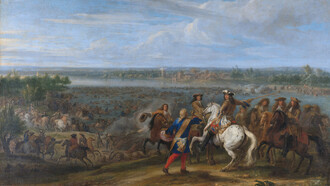Both the poems “Effects” and “The Identification” explore loss through the overarching theme of death.
In “Effects”, the voice looks back retrospectively at his mother’s gradual death, whereas the voice in “The Identification” is slowly coming to terms with the harrowing death of his son. The poems both look at how the death of a family member creates a sense of loss and how, through death, loss can leave a lingering impact.
Jenkins is able to convey exactly how much of an impact death can have simply through the choice of title. “Effects” is a term used in reference to a person’s belongings. The use of this somewhat stoic, holophrastic title sets the underlying tone for the poem, which is solemn and modest as we begin to perceive the voice’s regret as he reflects upon the way in which he treated his mother. Similarly, the word also carries a duality in its meaning: whilst the word itself references the physical, personal belongings of a person, it can also be interpreted as referring to the “effects” as a more abstract notion.
This title evokes connotations of impact, change, and development – the use of the abstract noun “effects” alludes to the overall theme of the poem, in which the voice reminisces on the lasting effects of the death of both his mother and father and the impact that loss has had on both him, as a child and his mother, as a wife, whose mental state took a spiralling plummet (“drink after drink”) following the death of her husband.
In the same way, McGough’s use of the title “The Identification” also reveals the solemn tone of the voice in the poem. The capitalisation of the noun “Identification” creates a sense of importance and reveals some sort of exceptional personal impact or importance in the mind of the poet. Potentially, it could be perceived as a deliberate decision by McGough to convey this feeling in a relatively flowing and unobtrusive way. Initially, the title is quite enigmatic in the eyes of the reader, who is unaware of who – or what – is being identified. To some extent, this enigmatic effect is ironic, because, as we read on, we see how the narrator already knows that it is his son being identified; he clings on desperately to his sense of denial, and, blinded by all his shock and horror, he distances himself from “the identification” and the harrowing effect of the loss.
The structure of both poems also plays a significant role in the portrayal of loss and its effects. In "Effects," the use of just one long, single stanza creates an initial impression of intimidation or a sense of being overwhelmed; this mirrors the effect of loss on the voice. However, the voice’s apparent sense of intimidation and being overwhelmed holds a sense of ambiguity, as it is unclear as to whether it is the loss of his parents which has evoked these feelings, or perhaps the sense of guilt felt by the narrator, who feels as though he was not there for his parents before their deaths and, instead, chose to ‘grow up’ and separate himself from them.
The use of caesura, particularly in the form of commas and full-stops, may make the poem more prosaic and descriptive than a normal poem. This, alongside the frequent use of listing, creates a more natural sense of speech and opinion. Interestingly, the natural, emotional, conversational effect this creates juxtaposes the solemn and almost morbid underlying tone of the poem. This juxtaposition here evokes Wordsworth’s idea of reflection at a later date: the two contrasting states of being emotional and yet distant, are almost symbolic of a conflict between the two sides and how, upon later reflection, the narrator looks back, retrospectively, at the lack of emotional sincerity he shared with his parents when they were still alive and the almost ‘overwhelming’ sense of remorse felt as he reflects upon this.
The listing throughout as the narrator says “in each cheap cut of meat, in roast […] old-fashioned food she cooked and we ate” strongly evokes an impersonal tone as the voice is simply listing the chores he remembers his mother doing for the family – adopting a very matter-of-fact tone - and yet, towards the end of the poem, when the poem is arguably at its emotional crux, we see the mother’s “last words” as she cries “please don’t leave”, alongside the use of enjambment, caesura and a rhyme scheme which, for a short second, become much more pronounced – all of which significantly increase the movement of the poem, almost as though this is an outpour of feeling and the voice is recounting this vivid myriad of emotion. The regular rhyme scheme right at the end of the poem helps create a sense of conclusivity and, perhaps, indicate a point of acceptance—the voice is accepting that he had ‘left’ his mother at her deathbed—and all he has left are her material “effects”.
The voice in “The Identification” also hints at an inner conflict, as the speaker is clearly struggling to come to terms with the loss of his son. The poem opens with the interrogative: “So you think it’s Stephen?”. Stephen’s father is constantly asking questions; he does not want to believe that his son is dead. The voice continues saying, “I’d best make sure/be on the safe side as it were,” and we slowly begin to see as the father tries to downplay the gravity of the situation—he is in denial. The voicing of 'be on the safe side as it were' shows a use of language that is cold and impersonal. McGough’s use of clichés here, and throughout the poem, reveals how the father is desperately trying to adopt a numbingly impersonal outlook on the situation and reveals the almost upsetting extent of his denial. The reader becomes inclined to feel sympathetic for the father, as he is portrayed as someone struggling to accept the indisputably morbid truth that confronts him.
The use of shocking imagery throughout is quite harrowing for the reader; for instance, the “mask of charred wood,” which we later find out is a “child’s face." This is significantly shocking, and it is shocking for the reader to witness, too. The utterance “a child’s face," in particular, is poignant as the reader is reminded of how the body being “identified” is the body of a child.
This poem is much more structured than that of “Effects”; there are several stanzas of equal length throughout. This could perhaps be a way to slowly reveal information to the reader and to create suspense as we reach the realisation that the body is, in fact, Stephen’s body and – more importantly – to watch as the father battles against his denial and slowly reaches that same revelation himself. A significant deviation from the structure, however, is seen at the end of the last stanza as the lines gradually become shorter. The repetition in the utterances “that’s it/that’s him/that’s our Stephen” ironically infers a feeling of conclusivity: the father is now certain that he is seeing his son. The father’s shift from a state of denial to a sense of realised defeat is quite poignant; it almost seems as though he was avoiding the pain of admitting the evident truth and having to confront what could inarguably be a father’s worst nightmare. Perhaps McGough realises this and shows the father’s struggle to accept the loss of his child as something readers can potentially identify with and empathise with.
Conclusively, the subject of loss is something that both writers explore intimately and personally, in such a way that evokes a quiet pathos within the readers and allows them to look into the intimate feelings and thought processes of both voices as they struggle to cope with and come to terms with the loss of a loved one. Although “Effects” tackles loss from the perspective of a child, whilst “The Identification” explores loss from the perspective of the parent, under close analysis, the effect of the loss of a loved one reads as just as poignant either way, from either perspective.















